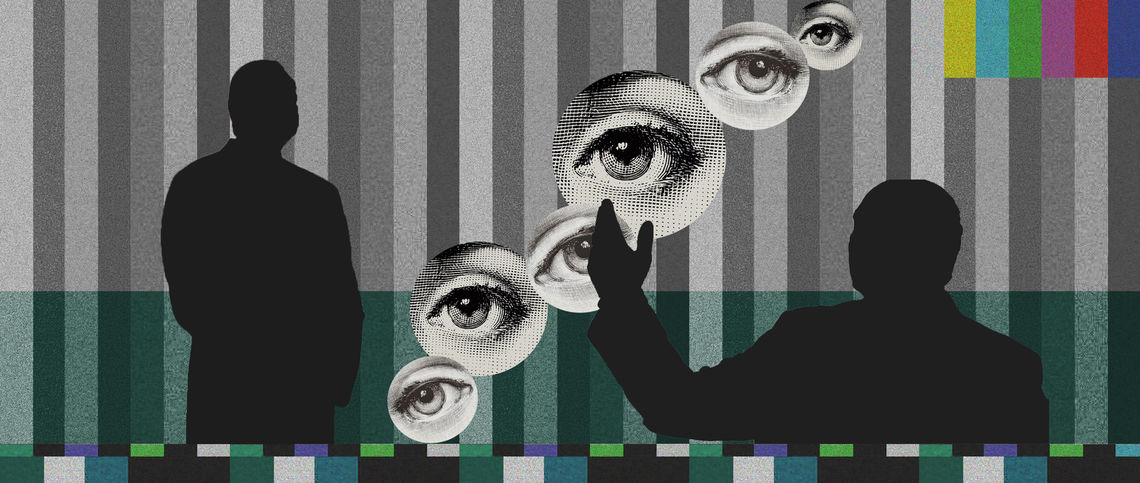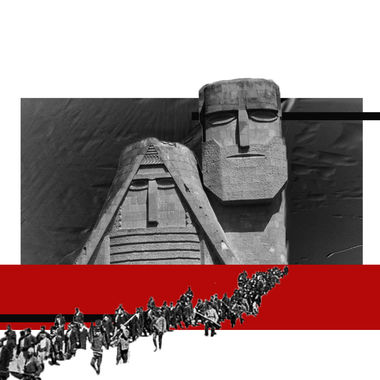
The Two Last Dictators in Europe
In English-language media, Aleksandr Lukashenko is commonly referred to as “the last dictator in Europe.” For the moniker to apply, however, one would have to consider the South Caucasus as beyond the European frontier because, if Georgia, Armenia and Azerbaijan are included in Europe, Lukashenko still has some competition in Azerbaijani President Ilham Aliyev.
Lukashenko has been reigning over Belarus since 1994, when the post of President of Belarus was created. He remains the only person to have held the office since Belarus gained independence. While his tenure is nine years longer than Ilham Aliyev, who succeeded his father in 2003, the father-son Aliyev duo has maintained its grip on power for longer, if taken together. Heydar Aliyev, a senior former communist official and KGB chief, became President of Azerbaijan in 1993, ten months before Lukashenko. He successfully passed power to his son before dying of heart problems in 2003 in a presidential election that OSCE/ODIHR observers said “failed to meet OSCE commitments and other international standards for democratic elections” and “reflected a lack of sufficient political commitment to implement a genuine electoral process.” Shortcomings included “widespread intimidation,” “seriously flawed” vote counting and “serious violence and an excessive use of force by police.” In fact, Azerbaijan is the only post-Soviet country to have pulled off a father-son transition of power.
In the 2020 Freedom House Nations in Transit report, Azerbaijan ranks second-last (tied with Uzbekistan and just ahead of Turkmenistan). Aliyev’s “consolidated authoritarian regime” received a score of 2/100, behind the 7/100 achieved by both Aleksandr Lukashenko in Belarus and Vladimir Putin in Russia. Taking the example of Belarus removing the two-term presidential limit from its constitution in 2004, Azerbaijan followed suit in 2009. As the three South Caucasus countries are members of the Council of Europe[1], the Union of European Football Associations (UEFA) and the European Union’s Eastern Partnership, Ilham Aliyev’s regime is the reason it is inaccurate to call Lukashenko “the last dictator in Europe.” The fact that Aliyev’s 17-year reign is overlooked is symptomatic of a deeper double standard.
Belarus Was Sanctioned
On August 9, 2020, Belarus held its most recent sham presidential election, which expectedly delivered Lukashenko a sixth term. The exercise, which proclaimed that Lukashenko had received 80% of the vote, didn’t fool anyone. As citizens crowded into the streets in protest, North American and European countries harshly condemned the fraud and subsequent police crackdown.
As the unrest continued, NATO countries began to impose sanctions on Belarusian officials. The first to act were Canada and the United Kingdom on September 29, 2020, when the 2020 Artsakh War had entered its third day. The official news release quotes Canadian Foreign Affairs Minister François-Philippe Champagne as saying “Canada will not stand by silently as the Government of Belarus continues to commit systematic human rights violations and shows no indication of being genuinely committed to finding a negotiated solution with opposition groups.” British Foreign Secretary Dominic Raab offered the following quotes: “Today the UK and Canada have sent a clear message by imposing sanctions against Aleksandr Lukashenko’s violent and fraudulent regime. We don’t accept the results of this rigged election,” and “We will hold those responsible for the thuggery deployed against the Belarusian people to account and we will stand up for our values of democracy and human rights.”
The sanctions included a ban on Aleksandr Lukashenko, his son and six other Belarusian government officials from entering Canada or the United Kingdom, and an asset freeze within the two countries’ legal jurisdiction. They came a month and a half after the post-election protests began.
The EU and the United States followed with their own sanctions a few days later on October 2, 2020. The delay was due to Cyprus demanding an equivalent response against Turkey for its drilling activities in the Eastern Mediterranean Sea. While no sanctions were imposed on Turkey at that time, the EU issued a “stern warning” and held open the possibility it might act if the drilling activities did not stop. The EU’s original list of 40 Belarusian officials facing sanctions did not include Aleksandr Lukashenko himself or his son, Belarusian National Security Advisor Viktor Lukashenko. They were not added until a month later, on November 6, following continued resistance to negotiating with the opposition. Canada expanded its list on the same day to include some of the officials that the EU had targeted.
As a part of the combined international effort, U.S. Treasury Secretary Steven Mnuchin said, “The Belarusian people’s democratic aspirations to choose their own leaders and peacefully exercise their rights [emphasis added] have been met with violence and oppression from Belarusian officials. The United States and our international partners stand united in imposing costs on those who have undermined Belarusian democracy for years.”
also read
The Mixed Messaging of Ilham Aliyev
By Joe Nerssessian
Armenophobic comments from Azerbaijani’s President are nothing new. He has long drummed up support among his population by promoting hatred against Armenians and using dehumanizing language, often referring to them as dogs and vermin.
Understanding the Aliyev Regime’s Armenophobia
By Nerses Kopalyan
The contours of Armenophobia presuppose the dehumanization of an entire people, where hatred and aversion towards an Armenian is embedded in Azerbaijan’s political culture, writes Nerses Kopalyan.
Yes, It Is Genocidal
By Suren Manukyan
The inclusion of the term genocide is not being loosely thrown around. As the war rages on, the potential for genocide against ethnic Armenians in Artsakh is very real and highly probable, writes Suren Manukyan.
Why Not Azerbaijan?
From the Armenian perspective, the references to upholding democratic rights as the motivation behind these sanctions imply that they should also be extended to the “other” last dictator in Europe, who launched a full-out military assault on Artsakh, using banned cluster munitions against civilian settlements and raining incendiary munitions over forests where civilians sought refuge from the rocket launcher barrage. There is no doubt that the Belarusian sanctions are well-deserved and may end up being a critical element in triggering new elections for Belarus; however, the hesitancy to exert the same pressure on Azerbaijan, which also held fraudulent elections this year, suggests that there is more to this group of NATO countries’ political calculus than simply upholding democracy.
The superficiality of Azerbaijani elections will never live down the moment in 2013 when the election commission accidentally released the official results through its online app the day before the voting actually took place. That was the year Aliyev ran for his third term, a hallmark maneuver of any autocrat (that was later also attempted by Serzh Sargsyan in 2018 but failed due to civil unrest). Heydar and Ilham Aliyev together are now into their sixth combined consecutive presidential term, the same as Lukashenko. Ilham Aliyev recently changed the length of presidential terms from five to seven years, to match what Lukashenko implemented as early as 1996. In 2017, he appointed his wife Vice-President after creating the position for her, to insure the family dynasty against any potential accident.
Under normal circumstances, Azerbaijan was slated to hold its parliamentary election to fill the 125 seats of its legislature in November 2020. However, in December 2019, it was decided to hold them nine months early instead, on February 9, 2020 with only two months’ notice. The tactic is a smart way to catch any potential opposition forces off-guard and even limit the planning period for international observers such as OSCE/ODIHR. Also, it is harder to keep post-election protesters outside in the middle of winter. In hindsight, one could speculate that this step was taken to get the election over with ahead of a planned invasion of Artsakh in the final stage of the U.S. presidential election later that year. The move was an authoritarian master stroke by Aliyev. He replaced a third of the legislature (though 81 of the 82 incumbents who did run again were re-elected), and his New Azerbaijan Party will not need to face voters again until 2025. Out of good fortune, he also got the election out of the way before the coronavirus pandemic and the associated slump in oil prices depressed Azerbaijan’s economic activity.
OSCE/ODIHR was able to send a rushed election observation mission to the February 9 election, including over 200 short-term observers. They made eight priority recommendations that included basics such as measures to prevent ballot box stuffing and ensuring an atmosphere free from intimidation and fear of retribution. The following are some highlights from its final report:
-
“The restrictive legislation and political environment prevented genuine competition.”
-
“Some prospective candidates were denied the right to stand.”
-
“Voters were not provided with a meaningful choice due to a lack of real political discussion.”
-
“Instances of pressure on voters, candidates and their representatives were observed.”
-
“Significant procedural violations during counting and the tabulation raised concerns whether the results were established honestly.”
-
“Following the opening of the ballot boxes, [observers] noted indications of ballot box stuffing, including clumps or stacks of ballots in 15 stationary and 2 mobile ballot boxes.”
-
“In 17 cases, [observers] noted evidence of deliberate falsification of voter list entries, results, or protocols.”
Javid Agha is an Ankara-based writer who participated as a poll watcher for one of the opposition candidates. He wrote about his experience in the Khatai district of Baku, where he says the official poll results were altered from the totals he observed.
Following the election, opposition party leaders were detained. Those participating in protests were rounded up in buses by police and some were even arrested at home before they showed up to the protest. Journalists covering the protests were beaten.
Where were the sanctions then? Where were the asset freezes against the Aliyev family’s embezzled offshore wealth as uncovered by the Panama Papers?
No Credit for Artsakh’s Electoral Reforms
In contrast, Artsakh also held elections in 2020. Just as the coronavirus pandemic was breaking out, but before cases were reported in Artsakh, 73,000 voters elected a new president and 33-member parliament on March 31, 2020, with a second round held on April 14. Under a new Electoral Code, Artsakh moved to full proportional representation, eliminating the last of its majoritarian district seats (a demand that voters in nearby Georgia had been calling for but were denied in their recent October 31, 2020 election, contributing to post-election protests there). The gender quota had been strengthened from 1 in 6 candidates to 1 in 4. They weren’t perfect; there were reports of misuse of administrative resources, but the main presidential challenger conceded the race and the results were not contested.
OSCE/ODIHR does not send observers to Artsakh and does not offer its recommendations. Despite Artsakh consistently ranking higher in Freedom House’s annual evaluations, Azerbaijan’s results are tacitly accepted while Artsakh gets this gem of a comment from the EU:
“In view of the so-called 'presidential and parliamentary elections' in Nagorno-Karabakh on 31 March 2020, the European Union reiterates that it does not recognise the constitutional and legal framework within which they are being held.”
Canada’s Embassy in Turkey, headed by Ambassador Jamal Khokhar, even tweeted:
🇨🇦supports the territorial integrity #Azerbaijan and doesn’t recognize the so-called “elections” held in Nagorno-Karabakh on 31/3. Such “elections” undermine efforts, incl by the OSCE #MinskGroup, to achieve a peaceful settlemnt of the NK conflict. #CanadainAzerbaijan @CanadaOSCE
— Canada in Turkey (@CanEmbTurkey) April 1, 2020
By suggesting that holding elections undermined a peaceful settlement, perhaps the Canadian embassy meant that advances in democratic processes would embarrass Aliyev into flipping over the table? While Azerbaijan had eliminated its two-term presidential limit, Artsakh reinforced its commitment to never fall under one-man rule by holding this election.
Erdogan Calls A Bluff
Talking about one-man rule, the previously-mentioned sanction threats against Turkey were raised again in the wake of Turkish President Recep Tayyip Erdogan’s row with French President Emmanuel Macron in early November. Erdogan came to power in 2002, one year before Ilham Aliyev. In that election, his party received two-thirds of the seats in parliament, despite only receiving one third of the votes cast, due to the aberration of Turkey’s abnormally high 10% electoral threshold that is designed to shut out Kurds from parliament.
In autumn 2019, the U.S. did impose sanctions on Turkey due to their purchase of the Russian-made S400 anti-aircraft weapon system and attack against the Kurds of northern Syria, who had been cooperating with U.S. troops in the fight against ISIS. Recognition of the Armenian Genocide by both the House of Representatives and the Senate followed suit.
Canada also placed a ban on arms sales to Turkey at the time but, after an April 23, 2020 phone call between Erdogan and Canadian Prime Minister Justin Trudeau, loopholes were created to allow circumvention of the ban, allowing sales of the Canadian-made target acquisition system used in the TB2 Bayraktar attack drone. The transfer of these drones to Azerbaijan is what upset the military equilibrium between Armenia and Azerbaijan that had kept both sides at the negotiating table.
When a 2017 constitutional referendum in Turkey turned that country from a parliamentary to presidential republic, concentrating power in the person of now-President Erdogan, congratulations poured in from autocrats like Aliyev, Lukashenko, Kazakhstan’s Nazarbayev and Vladimir Putin. U.S. President Donald Trump also sent his congratulations, while the EU expressed its worries about election irregularities.
Erdogan seems confident that, although Western countries may express their disappointment at his actions, they have yet to show a willingness to do much about it. Speaking to his party’s supporters on October 25, 2020, Erdogan was quoted as saying, “Some Americans call my brother Ilham [Aliyev] and tell him that if Turkey stands by Azerbaijan, they will impose sanctions on Turkey. The U.S. does not know who they are dealing with. Impose the sanctions already, whatever they may be.”
Teaching the Wrong Lesson
If Canada, the U.S., the UK and the EU were serious about upholding democracy, their window to impose penalties against Aliyev and Erdogan for their authoritarian and warmongering record is quickly closing. The war they started in Artsakh ended by firmly entrenching Russia’s footprint in the region, which will have downstream impacts on future elections in all three South Caucasus countries.
As far back as 2009, a U.S. diplomatic cable uncovered by Wikileaks described Ilham Aliyev as “Michael (Corleone) on the outside, Sonny on the inside,” referencing the main mobster characters from the movie “The Godfather” as it characterized a relationship with him as “a choice between U.S. interests and U.S. values.” The New York Times and The Atlantic went further in describing the specifics behind how he blackmailed investigative journalist Khadija Ismayilova and structured his web of offshore shell companies. Just the threat of an asset freeze over that stolen wealth could have ended the 2020 Artsakh War much sooner; it was only a matter of political will. In fact, it’s clear that it is years of inaction, tacit toleration and even direct military aid that allowed Azerbaijan to reawaken a conflict that had been in deadlock for 26 years.
A narrative among Armenians is already taking root that both NATO and Russia are happy to tolerate dictators, as long as they are unconditionally loyal, that democratic principles (and even acknowledgment of genocide) are only invoked by NATO countries as an excuse to pursue alternate foreign policy objectives and that, even after bribery schemes such as caviar diplomacy and the Azerbaijani Laundromat are publicly revealed, the European establishment will not be shamed into structurally adjusting its relationship with Aliyev.
The entire Nagorno-Karabakh conflict started with the trampling of democracy when the will of Artsakh’s people was ignored and answered instead with ethnic pogroms. Had Artsakh’s 1991 independence referendum been recognized by the international community 29 years ago, the South Caucasus could have been a very different place today.
-------------
1. Notably, Belarus was never admitted to the Council of Europe due to its failure to eliminate the death penalty, among other issues.






